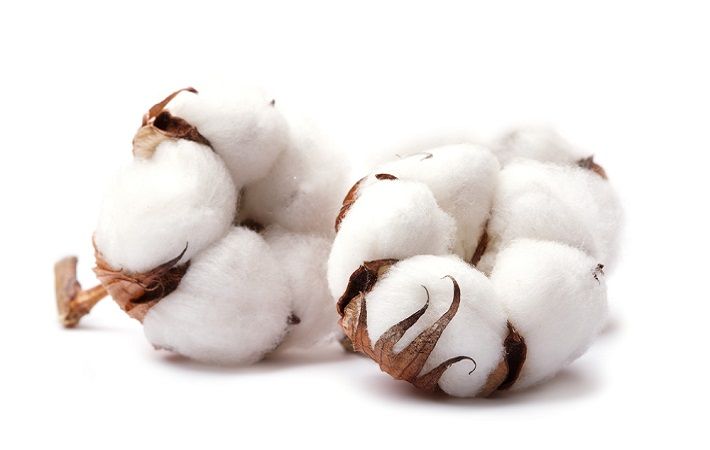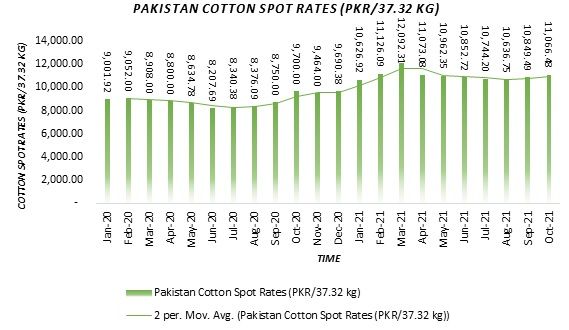Pakistan cotton spot rates to remain low in the coming months: TexPro


The average cotton spot rate of Pakistan was lower than expected at PKR 8,767.40 per 37.32 kg in the first half of 2020 due to the COVID-19 pandemic. It increased by 3.26 per cent to PKR 9,053.48 per 37.32 kg in the second half of 2020 over the average spot rate of first half of 2020, according to Fibre2Fashion’s market analysis tool TexPro.
The spot rate rose significantly by 24.04 per cent to PKR 11,229.60 per 37.32 kg during January 2021 to April 2021 due to a higher domestic and international demand, over the spot rate of second half of 2020. This rise was due to increased orders of cotton garments from domestic and overseas markets, less production of cotton in the country in marketing year (MY) 2020/21 (from August to July) and no plans to allow duty-free import of cotton from India.
However, the average spot rate of cotton is expected to move down by 3.36 per cent to PKR 10,852 per 37.32 kg during May 2021 to October 2021.
FPCCI Raw Cotton Committee had recently conducted a virtual meeting to discuss various things including certified quality seeds, elimination of fake pesticide, free-market system in cotton instead of fixing the spot rate and determination of acreage for sowing cotton and zoning for cotton crop.
A package of PKR 10 billion has been announced by the government for cotton farmers to revive the cotton crop in tPakistan even as the textile sector is not buying cotton amid increasing threats of lockdown during the third wave of the COVID-19 pandemic in the country. According to VP, Pakistan Central Cotton Committee, Dr Muhammad Ali Talpur, the government has also considered fixing the support price of cotton. A subsidy of PKR 1000 per sack on DAP fertiliser has already been announced by the PM.
Export demand was very strong, and the cotton production decrease was expected, according to Jack Scoville, vice president at Chicago based Price Futures Group. The All Pakistan Textile Mills Association (APTMA) said that the country has received export orders for the next six months. Exports grew by more than 18 per cent in December 2020 over the same period last year.
The cotton production of the country for MY 2020/21 was estimated at 4.70 million 480 lb bales, which was 24 per cent lower as compared to MY 2019/20 due to reduced plantation area, crop damage due to climate change and heavy monsoon rains and severe pest infestation. The prices of cotton yarn and cotton fabrics skyrocketed due to lower cotton production in the country.
From February 1, 2021, the government of Pakistan suspended the industrial sector from getting gas supply to their captive power plants. The suspension of gas supply to export sector was implemented from March 1, 2021. It further increased the cost of production of cotton products in the country, in addition to the higher cost of cotton yarn and fabrics due to a shortage.
In April 2021, cotton’s spot rates dropped as partial cotton sowing started in the country. Public and private organisations got ready to increase the production and FPCCI Raw Cotton Committee submitted proposals to the government for the same. The reduction in dollar worth against Pak rupee and a dip in cotton yarn rates also added to the sluggish business of cotton.
As the sellers for cottonseed exceeded the buyers, Federal Agriculture Committee (FAC) fixed the cotton sowing target at 2.33 million hectares with a production estimate of 10.50 million bales, much higher compared to the production this year.
According to the Pakistan Kissan Ittehad president, Chaudhry Muhammad Anwar, the input cost of cotton has increased manifold compared to other crops due to higher costs of pesticides, shortage of certified seed and dormant research institutes. The quality of Pakistani cotton has declined as compared to other countries. According to cotton analyst Naseem Usman, the fertiliser companies have increased prices of DAP due to a global demand and reduced supply from China.
The government of Pakistan has already removed the import duty on cotton yarn to give a boost to the cotton sector as shortage of cotton yarn halted the production of designer garments and fulfilment of the export orders. Many textiles and apparel associations of the country have demanded immediate removal of all taxes and duties imposed on cotton imports. Ginning sector has demanded uniform electricity tariff to reduce the cost of manufacturing and the support price of seed cotton before sowing.
Fibre2Fashion News Desk (KD)
































-Ltd..jpg?tr=w-120,h-60,c-at_max,cm-pad_resize,bg-ffffff)





.jpg?tr=w-120,h-60,c-at_max,cm-pad_resize,bg-ffffff)
.jpg?tr=w-120,h-60,c-at_max,cm-pad_resize,bg-ffffff)






